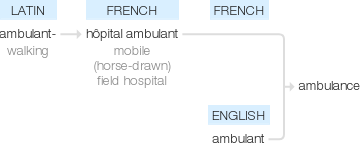Ambulance
early 19th century: French, from hôpital ambulant ‘mobile (horse-drawn) field hospital’, from Latin ambulant- ‘walking’ (see ambulant).
wiktionary
Borrowed from French ambulance, which replaced French ( hôpital) ambulant(“walking, shifting (hospital)”) via the suffix -ance, from Latin ambulō(“I walk, I go about”). [1]
etymonline
ambulance (n.)
1798, "mobile or field hospital," from French ambulance, formerly (hôpital) ambulant (17c.), literally "walking (hospital)," from Latin ambulantem (nominative ambulans), present participle of ambulare "to walk, go about" (see amble).
AMBULANCE, s. f. a moveable hospital. These were houses constructed in a manner so as to be taken to pieces, and carried from place to place, according to the movements of the army; and served as receptacles in which the sick and wounded men might be received and attended. ["Lexicographica-Neologica Gallica" (The Neological French Dictionary), William Dupré, London, 1801]
The word was not common in English until the meaning transferred from "field hospital" to "vehicle for conveying wounded from the field" (1854) during the Crimean War. Extended early 20c. to vehicles to transport the sick or wounded in civilian life. In late 19c. U.S. the same word was used dialectally to mean "prairie wagon." Ambulance-chaser as a contemptuous term for a type of lawyer dates from 1897.
